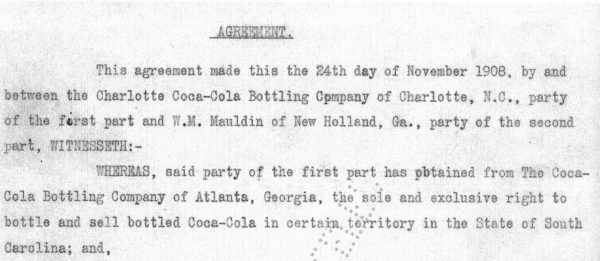Luther Snyder’s Biography
The Coca-Cola Bottler’s Newsletter of 1947 provides a biography of Luther Snyder and his involvement with Coca-Cola Bottling Company in Charlotte, North Carolina. Luther was working on his father’s farm in Clark County, Virginia, and was engaged to Miss Alfreta Crisman. Miss Crisman was related to Mr. J.T. Lupton, one of the three founders of the Coca-Cola bottling industry. Luther corresponded with his future brother-in-law about the business and found Lupton’s enthusiasm contagious. Snyder decided to venture into the Coca-Cola bottling business.
The Coca-Cola Bottler revealed that the letters from Mr. Lupton were realistic and encouraging. In 1901 he wrote to Snyder, “I am so glad you will come. I know you can make a success if you will carry out your present good intentions. You may not make big money out of the Coca-Cola business, but you can, at the very least, make a good living. The world needs honest, industrious, reliable businessmen. For such there are always openings to make money. I hope the Coca-Cola Business will offer you ample opportunity for all time. I don’t know this, but I do know that for some years it will give you all you can do…”
Luther Learns the Coca-Cola Bottling Business
Lupton and his partner, J. B. Whitehead, owned the exclusive rights to bottle and distribute the Coca-Cola drink in Charlotte, North Carolina and the surrounding territory. They offered Snyder a deal: Lupton and Whitehead would invest $2000 and Snyder $1000. They would split the profits accordingly. Lupton wanted Snyder to come to Atlanta to learn the business. In The Bottling Line’s History of Coca-Cola, Lupton described what it would take to have a successful business: “A man must be industrious, economical, and honest, have executive ability, apply himself and be enthusiastic in pushing his business. You should have two wagons, three or four mules, four or five men and boys and the necessary bottling equipment in order to manage your business. Then you must make friends with all the merchants and shopkeepers and by getting on their good side, persuade them not only to buy your goods and thus their sales, and to pay for what is bought. The business is exactly like the soda pop business, only better.”
Snyder saved his money, sold his horse and left the farm to go to Atlanta for training. He learned the business under Whitehead and was impressive in his performance. The partners offered Snyder the choice of the Charlotte, North Carolina, or Jacksonville, Florida territories. Luther had once visited Charlotte and remembered the friendly people and the charming city. He chose Charlotte and started operations in the spring of 1902. Luther wanted to be operational in time to prepare for the summer heat and thirst-quenching sales of Coca-Cola to the thirsty citizens of Charlotte.
A Rapid Success
Mr. Snyder was a rapid success. His franchise included ten counties, and he began to develop the Coca-Cola business in these counties/territories. The Rock Hill plant began operation on April 1, 1906. In the beginning the ownership mirrored that of the Charlotte plant. Mr. Snyder and his father-in-law controlled 2/3 of the operation and Mr. Whitehead (and later his widow, and Mr. Whitehead’s aunt, Miss Helen Conkey) of Clearwater, Florida, controlled 1/3 interest. The Rock Hill plant was capitalized at $2400.00. The first plant was on Elm Street, a street no longer in existence, but which in 1906 ran from the current Black Street to Johnston Street.
Quite a Stir in Rock Hill
He employed an overzealous salesman, Sam Harper, who created quite a stir in the development of the business in South Carolina, particularly Rock Hill. In the beginning Snyder’s father-in-law, A.D. Crisman, was managing the Rock Hill business for Snyder. Snyder felt the time was right to find someone to purchase the rights to the territory. Promises were made to multiple Rock Hill merchants to have the exclusive rights to sell Coca-Cola in Rock Hill. When the merchants discovered the multiplicity, Snyder had to intervene and withdraw the promises. He informed these merchants that the territory would be sold only to someone who had the money to purchase the rights and the business acumen to manage it.
William Mark Mauldin Steps In to Rock Hill
According to records, in 1908 the plant had burned to the ground with no insurance to cover the loss. Snyder had to convince Whitehead’s widow and aunt, Miss Conkey, to sell their stock in order to free the sale of the territory. This opened the door for William Mark Mauldin to fulfill his dreams of becoming a business entrepreneur. Mauldin was offered the choice between territories in Dade County, Florida, and Rock Hill, South Carolina. On November 25, 1908 Mauldin purchased the Rock Hill, South Carolina territory for $4750.00. He scrimped and saved and borrowed the money. Later Mauldin was told that Snyder might have sold him the rights for $3000. It was a running joke that Snyder loved to tell how Mauldin felt he owed him $1750. Snyder and Mauldin remained business associates, as well as friends, for the remainder of their careers with Coca-Cola.

